Coronavirus: Six test positive for COVID-19 in WA as China attacks Australia in cartoon
A COVID-19-infected live export ship at Fremantle Port in Western Australia was apparently cleared by a federal department to dock. It comes as China takes aim at Australia in a cartoon.
Coronavirus
Don't miss out on the headlines from Coronavirus. Followed categories will be added to My News.
China media launches scathing attack on Australia
Vaccine trials begin in Australia
China’s ‘bat woman’ says ‘tip of the iceberg’
Donald Trump hits back at gold critics
A COVID-19-infected live export ship was apparently cleared by a federal department to dock at Fremantle Port in Western Australia prior to local workers going on board.
The Al Kuwait arrived on Friday after sailing from the United Arab Emirates.
Six of the 48 multinational crew tested positive to the virus.
According to WA Police Commissioner Chris Dawson, half a dozen Fremantle Port workers boarded the ship since it docked.
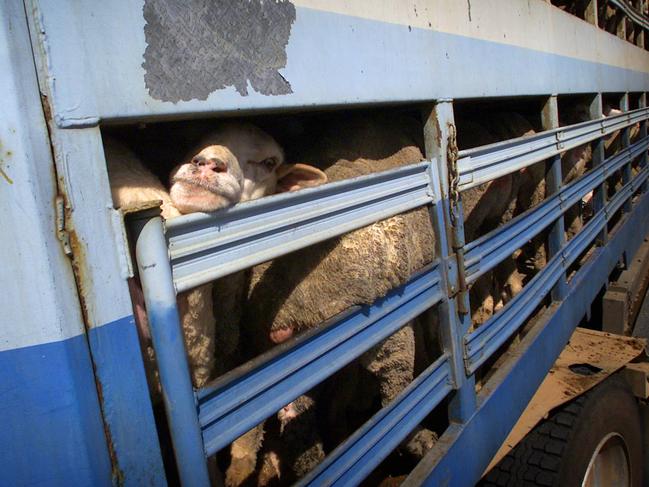
WA Premier Mark McGowan said he had been advised the federal Department of Agriculture was told crew members had a fever but did not pass the information on to the Fremantle Port Authority before the vessel berthed.
“I don’t want to point fingers at this point in time,” Mr McGowan said on Tuesday.
“We’re just trying to find out exactly what has gone on.
“Obviously we’re very concerned and to a degree, disappointed.”
Mr McGowan said the men who tested positive were being quarantined at a Perth hotel while the remaining 42 were being kept on board.
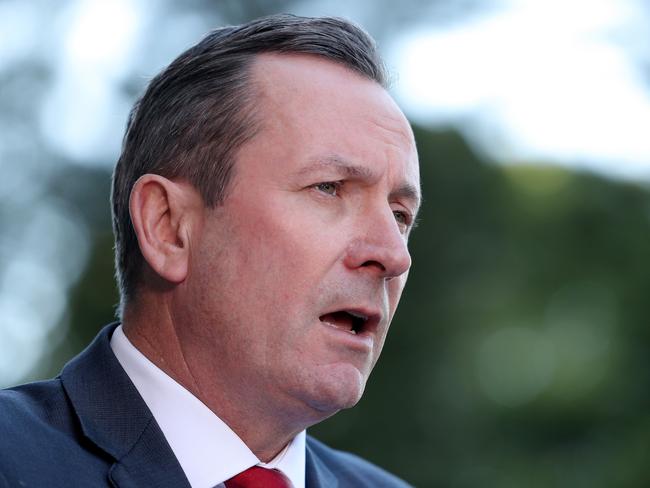
They would be monitored and given health assessments as required.
“This is a fast evolving situation,” he said.
“But I suspect it is probably more than likely that more crew members may become infected with the virus.”
Mr McGowan said the state government wanted the ship to sail as soon as possible but obviously needed to ensure the vessel was cleaned first.
“We’re working with the ship’s agents to get the ship to sail as soon as possible,” he said.
CHINA MEDIA LAUNCHES SCATHING ATTACK ON AUSTRALIA
Australia has been depicted as a donkey going into battle against China under the orders of the United States, in a cartoon released by China’s state media.
The latest attack on Australia by the Communist Party-owned China Daily comes with the caption ‘yes man to one, liar to all’, widely noted as a reference to the 17th century story of Don Quixote.
Quixote orders his servant Sancho Panza to charge towards a windmill in the mistaken assumption it is their enemy.
#ICYMI Yesman to one, liar to all pic.twitter.com/yxX2QfBZl9
— China Daily (@ChinaDaily) May 24, 2020
This comes as China has officially linked its hefty tariffs on Australian barley to past disputes between the two nations.
The Chinese commerce minister said Beijing had been cautious and restrained in imposing trade “remedies”.
Zhong Shan said China had only launched one trade investigation against Australia in almost 50 years, compared to more than 100 by Australia.
“This isn’t about keeping a tally or doing things in a tit-for-tat way,” Trade Minister Simon Birmingham told Sky News on Tuesday when dismissing the comparison.
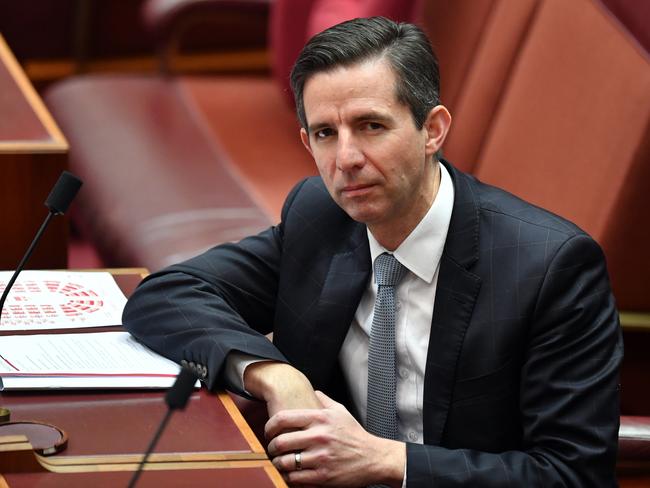
“Yes, Australia has an anti-dumping system that we use. Our decisions are open to appeal through the World Trade Organisation.
“China has not chosen to do that with any of our decisions to date.”
Senator Birmingham has been trying to speak to his Chinese counterpart about the barley dispute for several weeks. His phone calls have been ignored.
The minister is weighing up whether to appeal China’s 80 per cent tariff on Australian barley at the World Trade Organisation.
China has also suspended beef imports from four Australian abattoirs after the federal government called for a global independent inquiry into the origins of coronavirus.
MORE NEWS
PM to outline plans to lift economy ‘out of ICU’
Work out whether NBN is worth it
Johnson’s top aide ‘not sorry’ over lockdown fiasco
The cartoon is the latest in a series of aggressive moves by Chinese media against Australia.
The Global Times – regarded as the Chinese Government’s mouthpiece – last week called Australia the “dog” of the US President Donald Trump.
“Some Chinese netizens (citizens of the internet) also mocked Australia’s attempts as it has been trying to become a ‘martyr’ for defending so-called independence and transparency while its ideas were denounced by the global community,’’ it said.
“By following the steps of some US hawks who harshly attack China over coronavirus, it seems that Australia, this giant kangaroo that serves as a dog of the US, will hit a deadlock with China on trade disputes in sectors like coal and beef.”
The paper also reported last week China’s customs reforms at the ports were an “implicit warning to Australia” and our iron ore exports – despite assurances from Mr Birmingham the reform would be a positive outcome for Australia.
The paper’s editor, Hu Xijin, has repeatedly attacked Prime Minister Scott Morrison’s call for an independent inquiry into the origins of COVID-19.
Last month he described Australia as “gum stuck on China’s shoes” in a scathing editorial which also threatened economic consequences for the country.
“After the epidemic, we need to have more risk awareness when doing business with Australia and also when we send our children to study there,” he wrote.
“Australia is always there, making trouble. It is a bit like chewing gum stuck on the sole of China’s shoes. Sometimes you have to find a stone to rub it off.”
PREMIERS PRESSURED AS TRAVEL BUBBLE CHATTER CONTINUES
Talks about Australians travelling across the Tasman as coronavirus restrictions ease are continuing, with the prime minister heaping pressure on Labor premiers in QLD and WA to unlock state borders.
the National Press Club on Tuesday, Scott Morrison said: “It may well be that Sydneysiders can fly to Auckland before they can fly to Perth, or even the Gold Coast for that matter.”
NSW is encouraging interstate visitors to come for a holiday from June 1, when travel restrictions in the regions are relaxed.
But apart from Victoria and the ACT, all other states and territories are maintaining a hard line approach, fearing a second wave of coronavirus infections.
The federal government has warned it will not allow fortified states to become an obstacle to a “travel bubble” across the Tasman.
A panel of Australia’s top medical experts will be the final arbiters on restarting flights to and from New Zealand.
VACCINE TRIALS BEGIN IN AUSTRALIA
Trials of a COVID-19 vaccine have started in Australia with early results expected by July.
Around 130 Australians will be injected with a vaccine made by US biotechnology company Novavax.
The trial is being run by Nucleus Network a clinical trial research organisation based in Melbourne and Brisbane. It involves the Alfred Hospital in Melbourne.
The phase one trial will test the safety of the vaccine to ensure it does not cause any adverse health effects.
Much larger trials will be needed to prove the vaccine works to prevent people getting infected with coronavirus.
“Administering our vaccine in the first participants of this clinical trial is a significant achievement, bringing us one step closer toward addressing the fundamental need for a vaccine in the fight against the global COVID‑19 pandemic,” Novavax’s CEO and president Stanley C. Erck, said in a statement.
Nucleus Network CEO Cameron Johnson said his company has a rich history of phase one vaccine trials, and a longstanding track-record with Novavax.
“We are well positioned to implement rapid testing with first-in-human trials over the coming weeks,” he said.
Novavax’s has worked on vaccines for two other recent coronavirus epidemics – severe acute respiratory syndrome (SARS) and Middle East respiratory syndrome (MERS).
It also worked on a vaccine for Ebola.
The choice of an Australian company to carry out the trial was a “significant milestone” and underscored how Australia was in a prime position to conduct clinical trials at the moment because we had successfully flattened the COVID-19 curve, he said.
“We have definitely seen an increase in clients looking to Australia as a potential rescue for them as clinical trials in America or Europe aren’t being conducted due to the Government shutdowns,” Mr Jackson said in a statement.
Nucleus Network’s Chief Medical Officer (CMO) Dr Jason Lickliter added: “Australia is well-known internationally for its high quality of work … but it’s also known as having one of the fastest jurisdictions in the world to have a clinical trial approved, then up and running.
Though the theory of the proposed vaccine is proven, there are no guarantees of efficacy.
“If something is not going to work, you want it to fail early on so you can move on to the next thing that has a better chance of working” Dr Lickliter said.
In the vaccine trial participants are being injected with a purified protein of the coronavirus which sits on the surface of the virus.
There are no virus particles in the vaccine, so there is nothing which can proliferate or turn into an active viral infection, Dr Lickliter said.
Hopefully the person’s immune system will recognise the protein which makes up part of COVID-19, respond and eliminate the virus before the infection becomes severe.
He compared the phase one trial to safety testing of cars.
“Like testing cars at ANCAP, you get a car and you crash it in a certain way and you see what happens to the car,” he said.
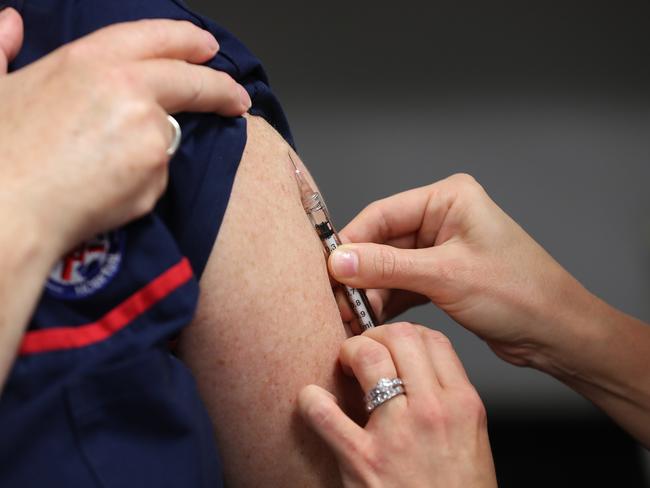
“The same is true with a vaccine trial: the company has made the drug the best it can and tested it on animals, and you’re confident that it’s safe, you know it produces an immune response in the animals, now it’s ready for human testing.” Dr Lickliter said.
During the phase-1 trial, the drug will be given in small doses to limit the adverse reactions if there are any.
Different doses of the vaccine will be tested and adjuvants may be added to increase the immune system’s response.
Some people will be given a dummy vaccine called a placebo to compare reactions between the real vaccine and a needle with no vaccine in it.
Participants will have their blood tested to check if they are developing antibodies against the virus and cellular-immune responses.
CHINA’S ‘BAT WOMAN’ SAYS VIRUS ‘TIP OF THE ICEBERG’
A Chinese scientist specialising in viral transmissions from bats has warned that coronavirus is “just the tip of the iceberg” in a television interview.
Shi Zhengli, a scientist dubbed China’s “bat woman” researcher, said on Chinese television on Monday (local time) that “if we want to prevent human beings from suffering from the next infectious-disease outbreak, we must go in advance to learn of these unknown viruses carried by wild animals in nature and give early warnings.”
“If we don’t study [the viruses], there will possibly be another outbreak,” Dr Shi warned.
Dr Shi works in the same Wuhan lab that was accused of accidentally unleashing the virus on humans.
She denies those claims, saying that her lab has been researching a different strain of coronavirus.
So far, the virus has killed more than 345,000 people around the globe.
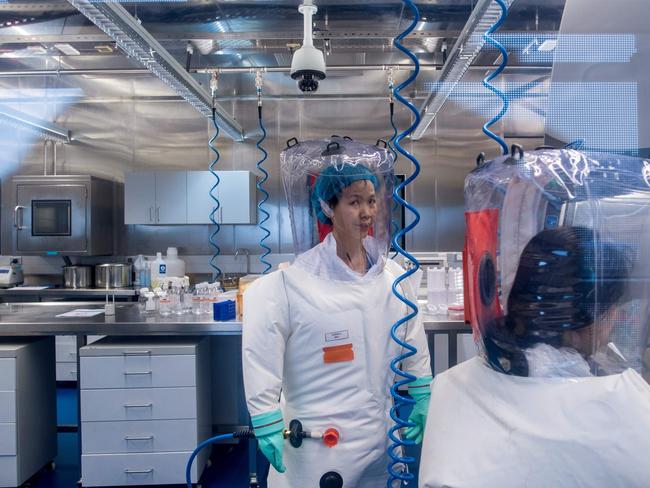
Meanwhile, the city of Wuhan has conducted more than 6.5 million coronavirus tests over a 10-day period in a bid to test all its 11 million residents, state media said Monday.
The city’s health commission, in a post on its website, asked anyone who hasn’t been tested to come forward by the end of Tuesday.
No new COVID-19 cases have been reported since the ten-day campaign started, though some people with no symptoms tested positive.
More than 3 million people had been tested prior to the campaign, the official Xinhua News Agency said.
Wuhan, where the global pandemic is believed to have started late last year, was by far the city hit hardest in China.
DONALD TRUMP HITS BACK AT GOLF CRITICS
Meanwhile, US President Donald Trump has fumed at negative media coverage of him playing golf over the US’ Memorial Day weekend, as the American death toll from the coronavirus pandemic neared 100,000.
“The Fake and Totally Corrupt News makes it sound like a mortal sin!” the golf-loving president said on Twitter, noting that the game at his own course in Virginia was the first time he had played since early March.
The timing of his outing, as the nation approached a milestone in deaths from the pandemic, sparked widespread criticism in the media, with commentators recalling Mr Trump’s own past attacks on his predecessor Barack Obama for playing the game during the 2014 ebola outbreak.
“There are times to play and times that you can’t play. It sends the wrong signal,” Mr Trump said at the time.
“You know when you’re president you sorta say, like, ‘I’m gonna give it up for a couple of years and I’m really gonna focus on the job,’” he said in 2014.
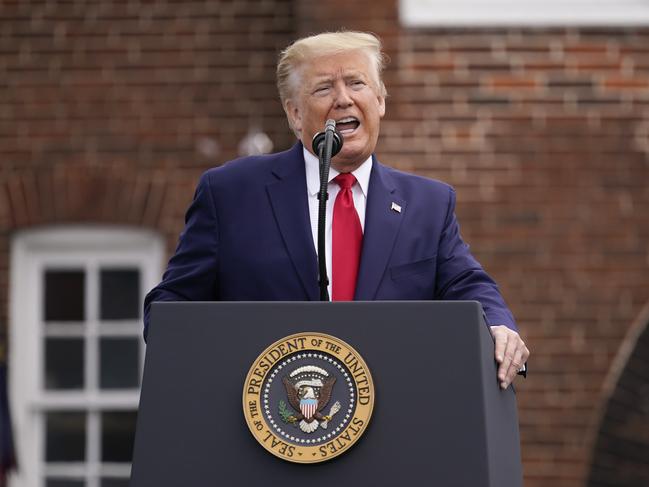
After being raked over the coals at the weekend, Mr Trump lambasted the media as being “sick with hatred and dishonesty.” “I knew this would happen!” he said.
“What they don’t say is that it was my first golf in almost 3 months, and, if I waited three years, they would do their usual ‘hit’ pieces anyway.”
The US President went on to say that in 2014 Mr Obama flew to his home state of Hawaii shortly after he had publicly denounced the beheading of American hostage James Foley by Islamic State militants.
Mr Obama apologised for the poorly timed visit afterwards and acknowledged the gravity attached to presidential behaviour at such moments.
Mr Trump received some unexpected support from one-time Obama adviser David Axelrod.
“I don’t often defend this @POTUS but I don’t begrudge him a round of golf,” Mr Axelrod, now a political commentator, said on Twitter.
“Besides, it gives the rest of us a respite from those crazy tweets! Yes, it’s hypocritical for @realDonaldTrump to have attacked @BarackObama for seeking some relief from the pressures of the presidency on the golf course when Trump has logged many more rounds,” he said.
“It’s also hypocritical to attack Trump for it now if you defended Obama then.”
HEALTH MINISTER: ‘NO REASON FOR BORDER CLOSURES’
Meanwhile, Federal Health Minister Greg Hunt says there is no medical reason for state borders to remain closed as momentum builds to allow holidays interstate.
Mr Hunt said no Commonwealth body had recommended the move to shut state borders.
While interstate travel was discouraged under current guidelines agreed to by National Cabinet, there are growing calls for greater movement to be allowed to bolster local economies.
Mr Hunt told reporters on Monday there was no reason for domestic borders to be closed, despite most states and territories implementing measures.
“At this point, there’ve been no Commonwealth recommendations in favour, there’ve been no National Cabinet recommendations in favour and there has been no medical expert panels in favour of state border closures,” he said.
“The National Cabinet three-step plan for recovery also included the progressive restriction- the progressive movement and lifting of state border restrictions.”
New South Wales Premier Gladys Berejiklian has taken aim at states with closed borders, claiming it was “hindering” Australia’s economic recovery.
Only Victoria, the ACT and NSW have resisted slapping bans on their borders, with Queensland’s Labor government going so far as declaring their borders could remain closed until September.
Australia is currently nearing the end of step one of an agreed three-step framework to ease restrictions.
The final step includes the possibility of travel to New Zealand, but restrictions are being eased slowly to ensure the virus is under control.
Deputy Chief Medical Officer Paul Kelly last week said border measures were not medically required.
“From a medical point of view I can’t see why the borders are still closed,” he said.
With mounting traction for a travel bubble with New Zealand to be created, Tourism Minister Simon Birmingham said stubborn domestic borders should not hold the plan back.
“If New Zealand and some Australian states are ready and willing to progress then the reluctance of other states to open up their domestic borders shouldn’t become an obstacle to progress.
“The recovery of jobs and small businesses in some states shouldn’t be held back by the decisions of other state governments.”
He said New Zealand was “obviously the first, and right now only” other nation safe enough to consider opening the borders.
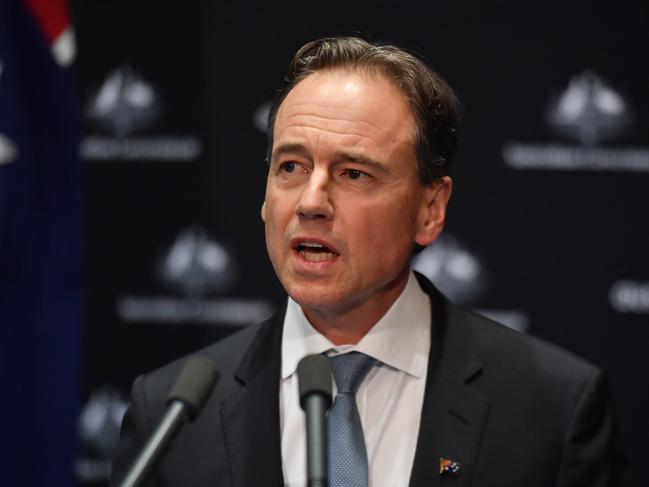
News Corp Australia understands countries including Fiji had hoped to welcome Australian tourists back as soon as possible but any talks were in their infancy.
Mr Hunt said the timing of the proposed trans-Tasman bubble was up to the AHPPC medical expert committee, Prime Minister Scott Morrison and New Zealand Prime Minister Jacinda Ardern.
“That is something that I think offers real prospect and hope for people on both sides of the ditch,” he said.
“It’s a really important thing that, if we can have greater international movement that is safe, we do that.
“They’ll look at when they think it’s safe.”
New Zealand has enjoyed very low case levels, with just 27 active cases remaining in the country yesterday.
From March, Australians have been banned from travelling overseas.
The strict border measures were put in place to prevent travellers returning with coronavirus.
Aussies landing on home soil are required to remain in a hotel quarantine for 14 days before being allowed home.
COLES LIFTS RESTRICTIONS
Retail giant Coles will lift all of its remaining buying restrictions on products from tomorrow as social restrictions continue to ease.
From Tuesday, customers will be able to as much as they like of items such as flour, pasta, rice, toilet paper, liquid soap and hand sanitiser.
Product limits had been placed on up to 24 products in early March as panic buying swept the nation.
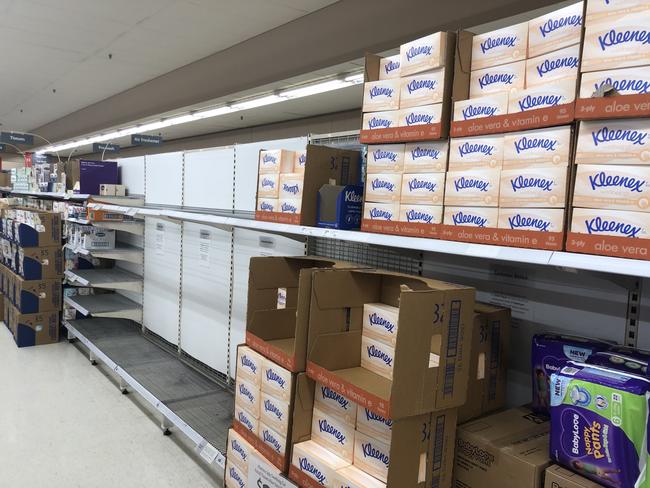
During the shortage, customers could only buy two packets or less per transaction and only one packet of toilet paper.
Antibacterial wipes and liquid soap are the final products to have buying limits removed tomorrow, following the lifting of restrictions on rice and flour last week.
The product limit of four tins of baby formula remains in place as this restriction was in place prior to the COVID-19 pandemic.
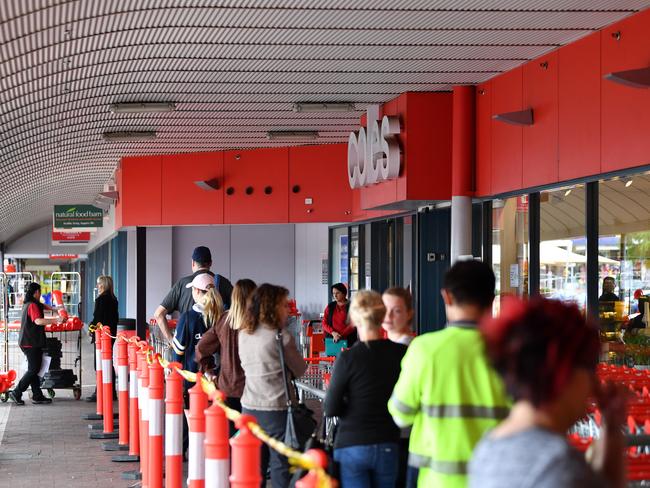
A Coles spokesman said the supermarket giant thanked customers for their patience during the nationwide restrictions.
“We know it’s been a challenging time for many and we hope having no buying restrictions on these every day products will help make life easier for our customers,” the spokesman said.
“We are also grateful to our suppliers and logistics partners who helped restock our shelves and the state and federal governments who helped us to get deliveries to stores as quickly as possible during the height of the crisis.”
Coles urged customers to maintain social distancing and follow guidelines to ensure the safety of the community.
JAPAN LIFTS STATE OF EMERGENCY
It comes as Japanese Prime Minister Shinzo Abe lifted a coronavirus state of emergency in Tokyo and four other remaining areas on Monday (local time), ending the restrictions nationwide as businesses begin to reopen.
Abe also unveiled a plan for a new stimulus package to support businesses hit by the pandemic.
Experts on a government-commissioned panel approved the lifting of the emergency in Tokyo, neighbouring Kanagawa, Chiba and Saitama prefectures, and in Hokkaido to the north, which had more cases and remained under the emergency declaration after it was removed in most of Japan earlier this month.
Under the emergency, people were asked to stay at home and non-essential businesses were requested to close or reduce operations, but there was no enforcement. Since May 14, when the measures were lifted in most of Japan, more people have been leaving their homes and stores have begun reopening.
Japan, with about 16,600 confirmed coronavirus cases and about 850 deaths, has so far avoided a large outbreak like those experienced in the US and Europe despite its softer restrictions.
“We were able to bring the outbreak nearly under control in just a month and a half in a uniquely Japanese way” without enforcing measures with penalties, Abe said. “We demonstrated the power of the ‘Japan model.’”
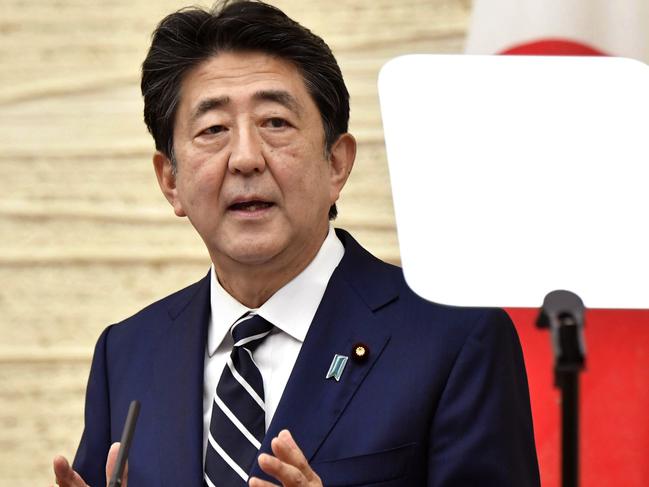
But the world’s third largest economy has fallen into a recession, and public discontent over Abe’s handling of the outbreak has sent his support ratings tumbling. Recent media surveys show public support for his Cabinet has plunged below 30 per cent, the lowest since he returned to office in December 2012.
Abe said the lifting of the emergency does not mean the end of the outbreak. He said the goal is to balance preventive measure and the economy until vaccines and effective drugs become available.
”Our goal is to create a new normal,” he said. “We need a new approach to resume our daily social and economic activity.”
The Japanese PM also said development of effective drugs and vaccines is essential for holding the Tokyo Olympics next year.
He said it isn’t enough for coronavirus infections to be under control in Japan if outbreaks continue elsewhere since the Olympics is an international event.
“I’m anxious to bring together wisdom from around the world to speed up development of vaccines and effective medicines,” Abe said.
Japan hopes to host the Tokyo Games “in a complete form” to demonstrate human victory over the coronavirus, he said.
In late March, Japan and the International Olympic Committee agreed to postpone the games by one year to July 2021.
Experts say developing an effective and safe vaccine by then is difficult.
INDIA FLIGHTS BACK IN AIR
Domestic airline travel partially resumed in India, which is easing its virus lockdown despite adding more than 6,000 new infections per day.
At New Delhi’s airport, passengers in masks or full protective suits stood in long lines to show identification and boarding passes to security personnel standing behind plastic partitions.
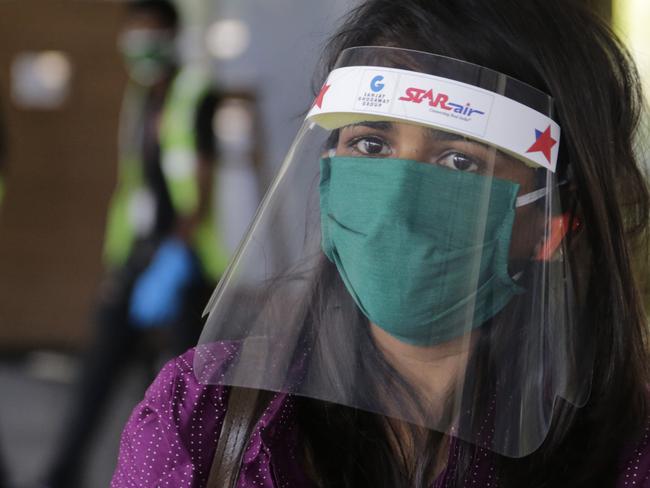
Ticket machines have been shifted outside, where airport workers sanitised baggage. Commercial flight traffic returned across India except for the states of Andhra Pradesh and West Bengal.
India’s Supreme Court has ordered social distancing norms in airports and in flight, forcing airlines to keep middle seats open.
NEW ZEALAND TO ALLOW CROWDS
New Zealand plans to further loosen its coronavirus restrictions by increasing the maximum size of gatherings from 10 people to 100.
Prime Minister Jacinda Ardern said the change would take effect midday Friday.
The timing is designed, in part, to allow religious services to proceed that day and over the weekend.
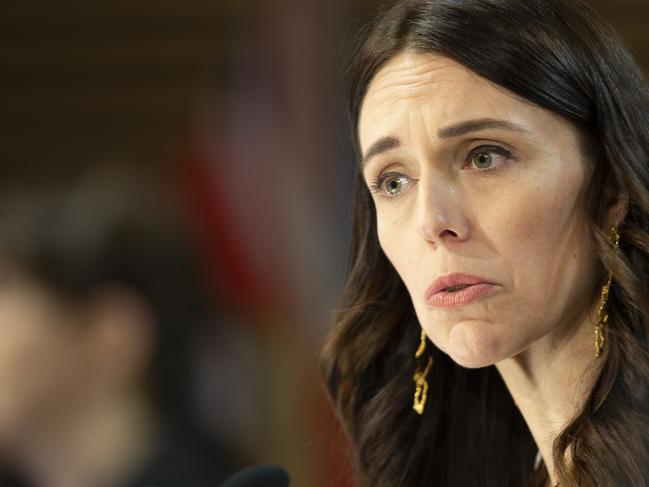
New Zealand has reported just one new case of coronavirus over the past week.
Ardern attributed that success to a strict early lockdown and people’s ongoing vigilance.
“We are still in a global pandemic,” Ardern said.
“Cases continue to grow overseas, and we still do have people coming home.
But for the most part, many aspects of life can and should feel much more normal.”
